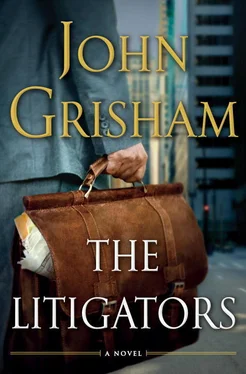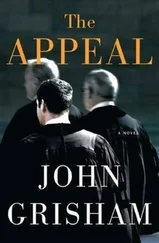“What’s his history with summary judgment motions made after the plaintiff rests?” Reuben asked.
“In the past twenty years, he’s granted more than any other federal judge in Chicago and the State of Illinois. He has zero patience with cases that cannot reach even the lowest standard of proof.”
“But I want a verdict,” Reuben said.
“Then we will forget summary judgment and start putting on witnesses. We have a lot, you’ve paid for them, and they will be unimpeachable. But I have a strong feeling that this jury is fed up.”
“Absolutely,” said Nick Walker, who had been in the courtroom for every word. “I suspect they’ve already started their deliberations, in spite of Judge Seawright’s admonitions.”
Judy Beck added, “Our consultants feel strongly that we should finish the case as soon as possible, definitely before the weekend. The verdict is all but in.”
Reuben smiled at Nadine and said, “So, Counselor, what’s your advice?”
“For me, a win is a win. Summary judgment is a slam dunk. If it goes to the jury, there’s always the risk of a freak accident. I would take the easy way out, but then I understand there’s more in play here than a ruling by a judge.”
“How many cases do you try each year?”
“Six is the average. I can’t prepare for more than that, regardless of staff.”
“And you haven’t lost in how many years?”
“Eleven. Sixty-four wins in a row, but who’s counting?” This tired line drew laughs far louder than it deserved, but everyone needed the humor.
“Have you ever felt this confident about a trial and a jury?” Reuben asked.
She took a sip of wine and thought for a moment, then shook her head. “Not that I remember.”
“If we go all the way to the verdict, what are our chances of winning?”
Everyone watched her as she took another tiny sip. “A lawyer is not supposed to make these predictions, Mr. Massey.”
“But you’re not a typical lawyer, Ms. Karros.”
“Ninety-five percent.”
“Ninety-nine,” Nick Walker said with a laugh.
Reuben took a gulp of his third Scotch, smacked his lips, and said, “I want a verdict. I want the jury to deliberate briefly and walk back into that courtroom with a verdict for Varrick Laboratories. To me, a verdict is repudiation, it’s revenge, retribution, it’s a lot more than victory. I’ll take the verdict and splash it all over the world. Our PR people and ad agencies are ready and itching to go. Koane, our man in Washington, assures me that a verdict will break the logjam at the FDA and get a reversal. Our lawyers from coast to coast are convinced a verdict will even further frighten the tort boys and send them running for the hills. I want a verdict, Nadine. Can you deliver it?”
“As I said, Reuben, I’m 95 percent sure.”
“Then that settles it. No summary judgment. Let’s bury these bastards.”
At exactly 9:00 on Thursday morning, a bailiff called the court to order and all rose for the entrance of His Honor. When the jury was in place, he said abruptly, “Continue, Mr. Zinc.”
David rose and said, “Your Honor, the plaintiff rests.”
Judge Seawright was not at all surprised. “Lost some more witnesses, Mr. Zinc?”
“No sir. We’ve simply run out of them.”
“Very well. A motion, Ms. Karros?”
“No, Your Honor, we are ready to proceed.”
“I suspected that. Call your first witness.”
David suspected it too. He had allowed himself to believe that the trial would end abruptly that morning, but it was obvious Nadine and her client smelled blood. From there on, he would have little to do but listen and watch a real courtroom lawyer.
“The defense calls Dr. Jesse Kindorf.” David glanced at the jurors and saw several smiles. They were about to meet a celebrity.
Jesse Kindorf was a former surgeon general of the United States. He held the position for six years and was brilliantly controversial. He castigated tobacco companies on a daily basis. He held large press conferences in which he exposed the fat and caloric content of popular fast foods. He released scathing condemnations against some of the most trusted names in corporate America, consumer product companies that were flat-out guilty of producing and marketing mass quantities of highly processed foods. At various times during his tenure, he was on the warpath fighting butter, cheese, eggs, red meat, sugar, soft drinks, and alcohol, but his most famous brouhaha occurred when he suggested a ban on coffee. He thoroughly enjoyed the spotlight, and with his good looks, athletic build, and quick wit he became the most famous surgeon general in history. The fact that he had crossed the street and was now testifying on behalf of a major corporation was a clear signal to the jurors that he believed in the drug.
And he was a cardiologist, from Chicago. He took the stand and flashed a smile at the jury, his jury. Nadine began the arduous process of going through his credentials in order to have him qualified as an expert. David quickly jumped to his feet and said, “Your Honor, we are happy to stipulate that Dr. Kindorf is an expert in the field of cardiology.”
Nadine turned, smiled, and said, “Thank you.”
Judge Seawright growled, “Thank you, Mr. Zinc.”
The gist of Dr. Kindorf’s testimony was that he had prescribed Krayoxx to thousands of his patients over the past few years, with no side effects whatsoever. The drug worked beautifully for about 90 percent of his patients. The drug dramatically lowered cholesterol. His ninety-one-year-old mother was on Krayoxx, or was until it was pulled by the FDA.
The paralegal scribbled a note on her legal pad and handed it to her boss: “Wonder how much they’re paying him?”
David scribbled back as if they were discussing a major flaw in the testimony. “A lot.”
Nadine Karros and Dr. Kindorf worked their way through a flawless round of batting practice. She served up the fat pitches, he knocked them out of the park. The jury wanted to cheer them on.
When Judge Seawright asked, “Any cross-examination, Mr. Zinc?” David rose and politely said, “No, Your Honor.”
To curry favor with the blacks on the jury, Nadine called a Dr. Thurston, a dapper, distinguished black gentleman with a gray beard and finely tailored suit. Dr. Thurston was also from Chicago and was the senior physician in a group of thirty-five cardiologists and cardiovascular surgeons. In his spare time, he taught at the University of Chicago School of Medicine. To move things along, David did not question his credentials. Dr. Thurston and his group had prescribed Krayoxx to tens of thousands of their patients over the past six years, with spectacular results and no side effects. The drug, in his opinion, was perfectly safe; indeed, he and his colleagues viewed it as a miracle drug. Its presence was sorely missed, and, yes, he planned to immediately resume prescribing it when it reappeared on the market. Most dramatically, Dr. Thurston revealed to the jury that he had taken Krayoxx himself for four years.
To get the attention of the Hispanic lady on the jury, the defense called Dr. Roberta Seccero, cardiologist and researcher at Mayo Clinic in Rochester, Minnesota. David gave the green light on credentials, and Dr. Seccero, to no one’s surprise, sang like a bird on a spring morning. Her patients were mostly women, and the drug did everything but make them lose weight. There was no statistical evidence that those taking Krayoxx were likelier to suffer heart attacks or strokes than those who didn’t take it. She and her colleagues had researched this at length, and there was no doubt. In her twenty-five years as a cardiologist, she had never seen a safer and more effective medication.
Читать дальше












